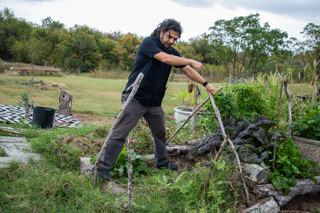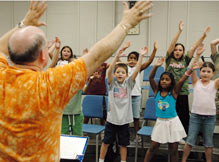By André Green/south news editor
Tarrant County College’s downtown development project may need to change course, school and city officials learned at a breakfast Friday, June 15.
An East Coast architectural team discussed ways to improve and possibly redesign what is expected to be the central gathering point in the campus’ plans.
The current design calls for a sunken plaza north of Belknap Street where students and residents can gather or use as a thoroughfare to reach both sides of the Trinity River.
The group cited examples of failed city projects where the intent was to draw people but discovered that people were less interested in walking below street level thus placing businesses in jeopardy.
The new proposal calls for the downtown campus to be the focal point of the river project with street level shops and open kiosks on the Trinity River expanding outward bridging cultural and ethnic divides on the city’s North Side, group member Frank Kent said.
M. David Lee of Stull and Lee Architects and Planners in Boston said the new proposal is a win for the city and would be a major draw for not only students, but also residents and visitors to Fort Worth.
The goal, Lee said, is to connect downtown and uptown and return to the civic square mimicking the success of such places as Chapel Street in New Haven, Conn. and Campus Martius Park in Detroit, Mich.
Residents recently voted Campus Martius as the third most important destination since its completion two years ago, Kent said.
“ You want to create an atmosphere where people want to go, not have to go through,” he said. “You also want to create as much public space as possible.”
Kent said the city and the project would benefit from a “power of 10” development.
“ Fort Worth’s downtown needs 10 major places,” he said. “Those 10 places then must have 10 places, destinations and things to do and so on,” he said.
Kent described the model as reaching out like an octopus that would vitalize city commercial and residential areas as well as utilize ethnic and cultural differences in a common area leading ultimately to a successful and popular city with the downtown campus as the starting point.
In May, the TCC board approved a $63 million funding increase, raising the proposed guaranteed maximum cost to $297.5 million.
If any of the group’s proposals are implemented, the board may have to review the maximum cost for the project once more.
Chancellor Leonardo de la Garza said the proposal would be presented to the seven-member board of trustees. An ad hoc task force would then decide whether to implement all, some or none of the recommendations proposed in the meeting.
“ Every month of delay incurs a loss of $1.7 million,” he said.
Lee said he believed the committee would likely approve some of the changes in the design plans.
“ They may take up some,” he said. “And depending on who’s willing to step up to the plate, they may take up more.”
A decision by the committee is expected in the coming days.




















